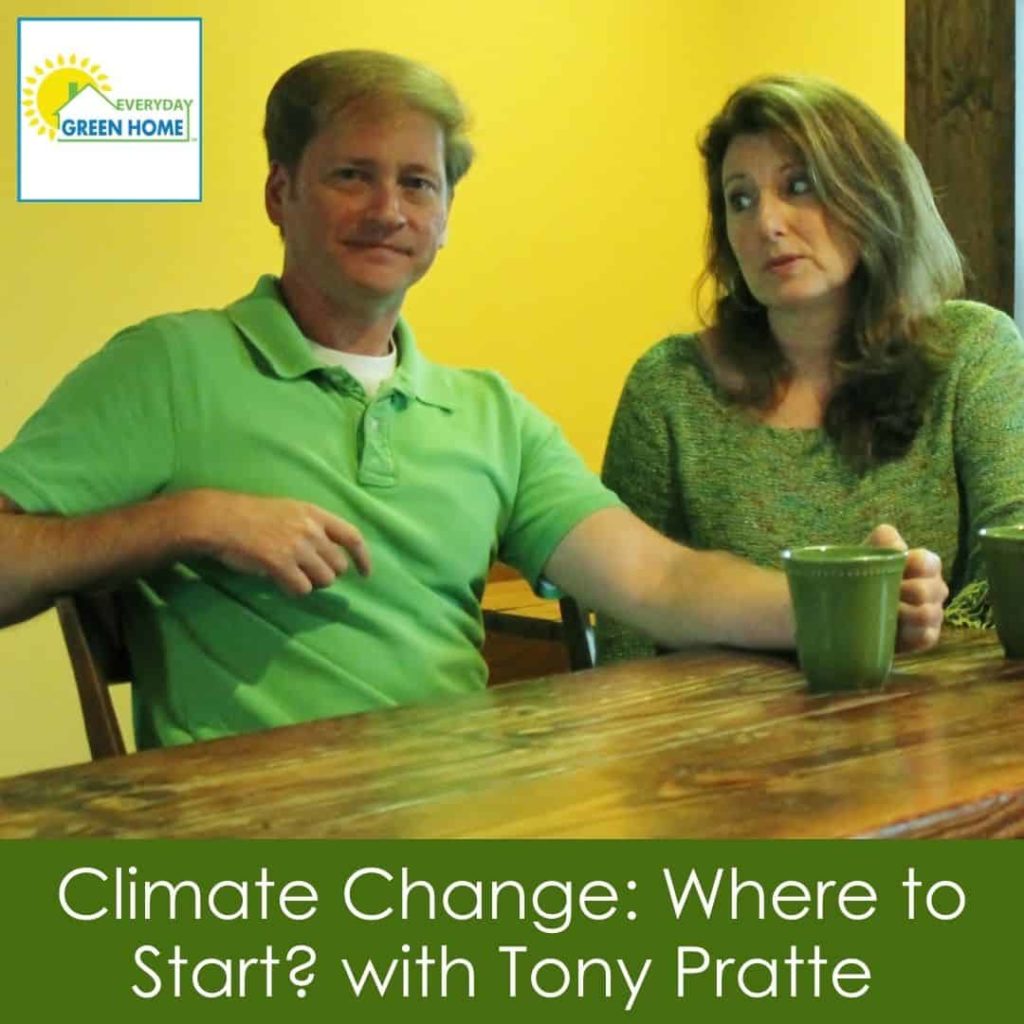
I’m Marla, on the Everyday Green Home Podcast. I am excited to have Tony Pratte joining me on the show today! Tony and I are good friends. We have known each other and worked together for many years. He used to be a regular co-host on this podcast back when it was called The Green Gab.
Today, we will be talking about a big, hot topic. We will be discussing the climate crisis, also called climate change or global warming.
Our intention for this podcast is to set up some basics around that topic, and to look at some of the key points to follow. We hope to give you a baseline for having this conversation in your life and generate some thinking that might be different from the way you used to think.
Tony and I are not in full agreement on all aspects of this topic. However, we both feel that it is important for us, as a society, to learn how to agree to disagree about certain things, to allow us to have these conversations.
We will base our conversation primarily on three things: emotions, transparency and trust, and politics.
Positive conflict is a powerful tool
Tony is an expert in team development. He knows that team building involves understanding conflict and knowing that positive conflict is a powerful tool. It is a tool to unlock creative energies, and those creative energies can always lead to creative problem-solving.
A solution-based mindset
Tony points out that although most people have a problem-based mindset, true leaders understand that you need to have a solution-based mindset to overcome any problem. So, you need to identify the problem and then discuss the solutions.
Framing the conversation
To frame the conversation as we go forward, we need to bear in mind that we should always aim to do no harm.
A complicated issue
Many people feel uncomfortable having the conversation we are having today about global warming because we are dealing with a complicated issue. It is a passionate discussion, and it runs to the emotions. None of us want to think we are bad people or that we are wrong.
Dealing with emotions with grace
Our word for 2020 was grace. We need to be able to both give and receive grace. Grace can be a good baseline to help us get through the emotions that arise when we talk about difficult topics like the one we are discussing today.
Taking action
We need to take action, regardless of our beliefs and emotions. We need to figure out how to find solutions.
This conversation
Sharpening our listening skills becomes vital for the conversation about climate change and global warming. You have to be able to handle another person’s emotions on this topic with grace. Our biases are very strong things, so you need to fully understand what the other person is saying and validate their opinions, whether you agree with them or not, to move forward.
Compassion
Developing your compassion will help you to discuss this emotive topic with grace.
Transparency and trust
Transparency engenders trust. Currently, we live in a society and in a time of a constant information cycle. We have a class of leaders in politics, business, and thought who cannot wrap their heads around the current 24/7 information cycle because everything they do can get found somewhere. As a result, they need to be concerned about anything that they might be hiding.
Money
Money is influencing the topic of climate change on all sides. The motivation is to keep the conversation narrow and as simple as possible. Because when the conversation takes its true and complicated form, it becomes hard to influence others.
Influence
For Tony, talking about transparency and trust comes down to the fact that people are trying to influence others based on power and money.
Products
Most of us always trusted the people who provide the products that we buy. Now, we are discovering that there are skeletons in the closet, and there are words in the lists of ingredients on the products that mean something quite different from what those words truly mean. That adds to the element of distrust.
Cognitive bias
When people realize that they cannot trust someone, they revert to their cognitive bias and develop a stronger emotional connection to that bias.
Well-paid spin doctors
Tony believes that in politics, there is a legion of well-paid spin doctors who are there to keep discussions binary. So for today’s topic, you either believe in climate change and that it is real and dangerous, or you are a climate deny-er, and you think it is all a hoax.
Constituents
As constituents, we have the power to pay more attention to those for whom we are voting.
We need to question
We should not allow politicians to frame an argument in one way or another. That is ultimately our personal choice, so we need to start questioning everything.
To truly understand
To truly understand what goes on, you have to listen actively, have both eyes open, and leave any preconceived judgment, cognitive bias, or politics at the door.
Referral Links:
My website Green Home Coach
Book: Living Green Effortlessly
Facebook Group: Love Your Everyday Green Home
Follow @greenhomecoach on Instagram
Like Green Home Coach on Facebook
Global Weirding with Dr. Katharine Hayhoe on YouTube
Matt Ridley – A Lukewarmer’s Ten Tests (PDF)
Compassion Center @Emory University
Get 5 Myths of Green Homes to reveal the true value that is commonly overlooked in virtually every home!
At Green Home Coach, helping you to create and discover healthier, more comfortable homes is what I do. I work with home professionals – designers, builders, realtors, and more; home owners and dwellers … just about anyone that works with a home in some way.
© Green Home Coach 2024 | An Oakes Creative House Site | Privacy Policy | Terms of Service
Photography by SLPhotography | Home page image provided by Chelsey Seaton Photography